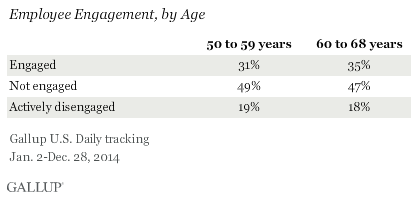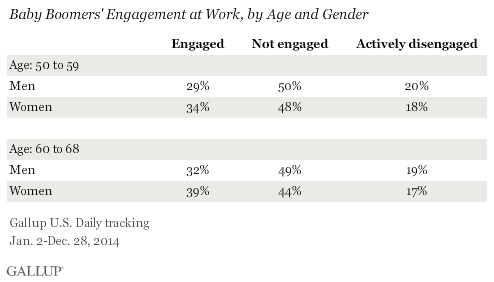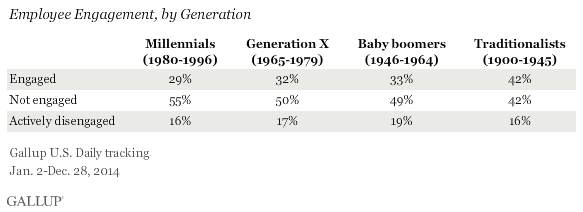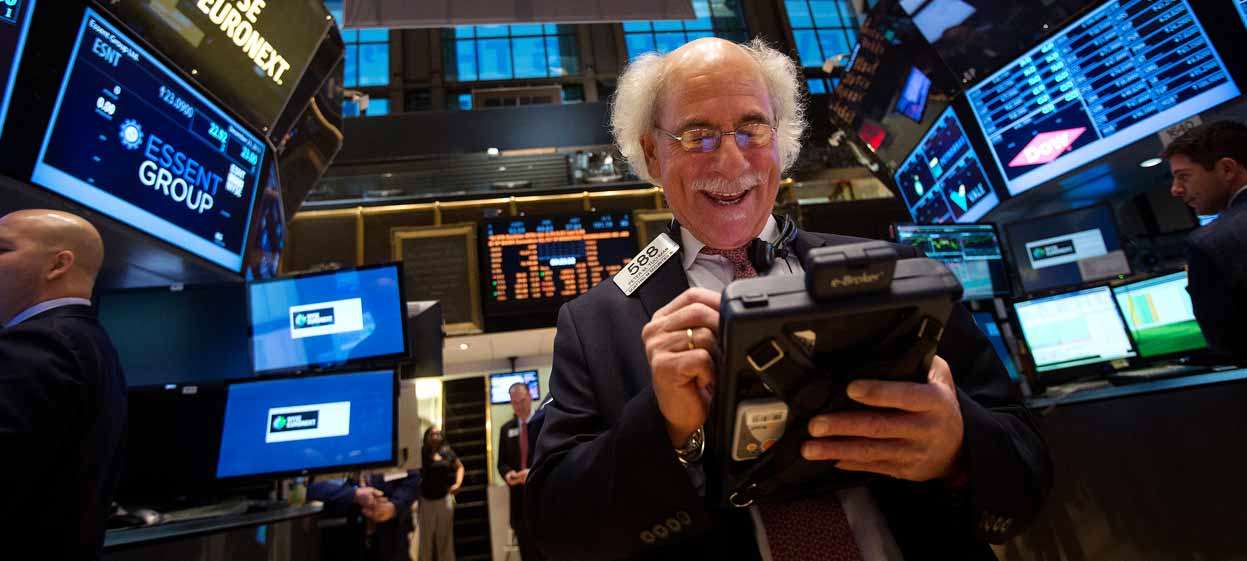This article is part of an ongoing series analyzing how baby boomers -- those born from 1946 to 1964 in the U.S. -- behave differently from other generations as consumers and in the workplace. The series also explores how the aging of the baby-boom generation will affect politics and well-being.
WASHINGTON, D.C. -- The percentage of U.S. workers who are still in the workforce begins to drop steadily after age 60, but those who continue to work are more likely to be engaged -- involved in and enthusiastic about their work and more productive members of their workplace -- than younger workers.
Baby boomers, the oldest of whom was 68 in 2014, comprise a large segment of those who remain in the workforce after age 60. Older baby boomers in the workforce, those aged 60 to 68, are more likely to be engaged in their work and workplace (35%) than younger baby boomers, those aged 50 to 59 (31%). This suggests a possible winnowing effect, in which engaged workers are most likely to remain in the workforce after age 60, perhaps because they have the best job situations.

Gallup categorizes survey respondents as "engaged," "not engaged" or "actively disengaged" based on their responses to questions about workplace elements with proven links to performance outcomes. These results are based on surveys of 30,562 baby boomers employed for an employer from Jan. 2 to Dec. 28, 2014, as part of Gallup Daily tracking.
Women Aged 60 to 68 More Engaged Than Other Boomers
Engagement differences between younger and older baby boomers are even more pronounced by gender, with older baby boomer women (39%) substantially more engaged than their male age equivalents (32%) as well as female baby boomers under the age of 60 (34%). In general, women are more likely to be engaged in their work and workplace than men.

Older Baby Boomers Close the Engagement Gap With Traditionalists
As a whole, baby boomers are just as engaged in their jobs as Gen Xers, defined as those born just after the baby-boom generation, but are more likely to be engaged than millennials, defined as those born after 1979. However, boomers are less likely to be engaged than the oldest generation, traditionalists. Although most traditionalists are no longer working, 42% of those who are still working are engaged in their work. The engagement gap between traditionalists and older baby boomers is four percentage points narrower that that of traditionalists and younger boomers. This appears to reflect the basic pattern by which employee engagement increases with age, even well into workers' 60s and 70s.

Bottom Line
Higher engagement for those who stay in the workforce as they age beyond 60 may indicate that those who choose to continue working are more likely to do so because they find their work fulfilling. It is also possible that as workers age, they become increasingly better at finding work that suits them. And it could be that older workers are more serious about their work as they recognize that the end of their working life is approaching.
While workforce participation drops off dramatically after age 60, previous Gallup research indicates that nearly half of baby boomers still working say they don't expect to retire until they are 66 or older, including one in 10 who predict they will never retire. Those who remain in the workforce appear to fall into two groups -- those who need to work because they don't have enough money to do everything they want to do and those who want to work because they find their work fulfilling. Those who need to work are less likely to be engaged than those who want to work.
It is encouraging, though, that in the aggregate, the baby boomers who stay in the workforce at age 60 and above are more likely to find work that is rewarding. They are 13% more likely than younger boomers to strongly agree that their opinions count at work, and are 10% more likely to say they have an opportunity to do what they do best.
Although it is not clear if baby boomers are going to be more likely to delay retirement, these findings demonstrate how important it is for managers to engage older boomers, which improves their lives while boosting the performance of their organizations. Organizations can gain a competitive advantage by having managers who make use of older workers' experience, help older workers identify and apply their strengths, position them to do what they do best and listen to their opinions and insights. These organizations are likely to not only reap the benefits of engaging baby boomers who want to work, but could also convert those who need to work into those who also want to work because they find their work meaningful.
Survey Methods
Results for this Gallup poll are based on telephone interviews conducted Jan. 2-Dec. 28, 2014, on the Gallup U.S. Daily tracking survey, with a random sample of 80,837 working adults, aged 18 and older, living in all 50 U.S. states and the District of Columbia. For results based on the total sample of working adults, the margin of sampling error is ±1 percentage point at the 95% confidence level. For results based on the total sample of 30,562 working baby boomers, the margin of sampling error is ±1 percentage point at the 95% confidence level. All reported margins of sampling error include computed design effects for weighting.
Each sample of national adults includes a minimum quota of 50% cellphone respondents and 50% landline respondents, with additional minimum quotas by time zone within region. Landline and cellular telephone numbers are selected using random-digit-dial methods.
Learn more about how the Gallup U.S. Daily works.
